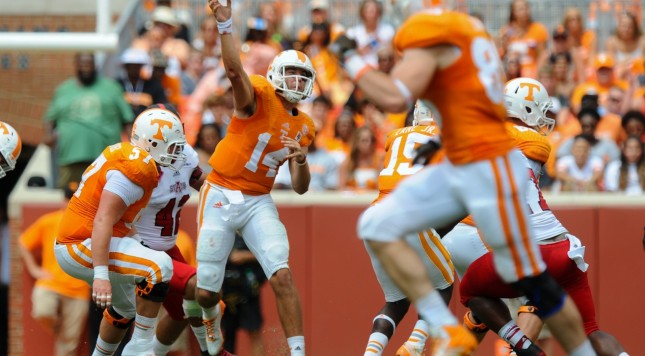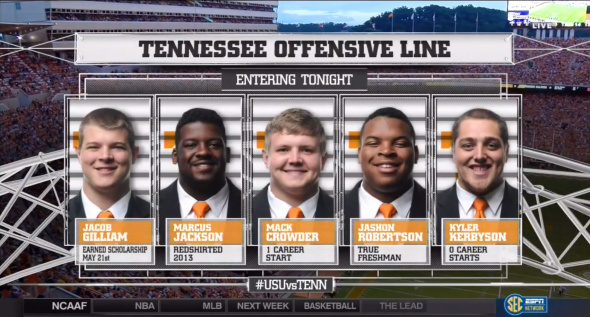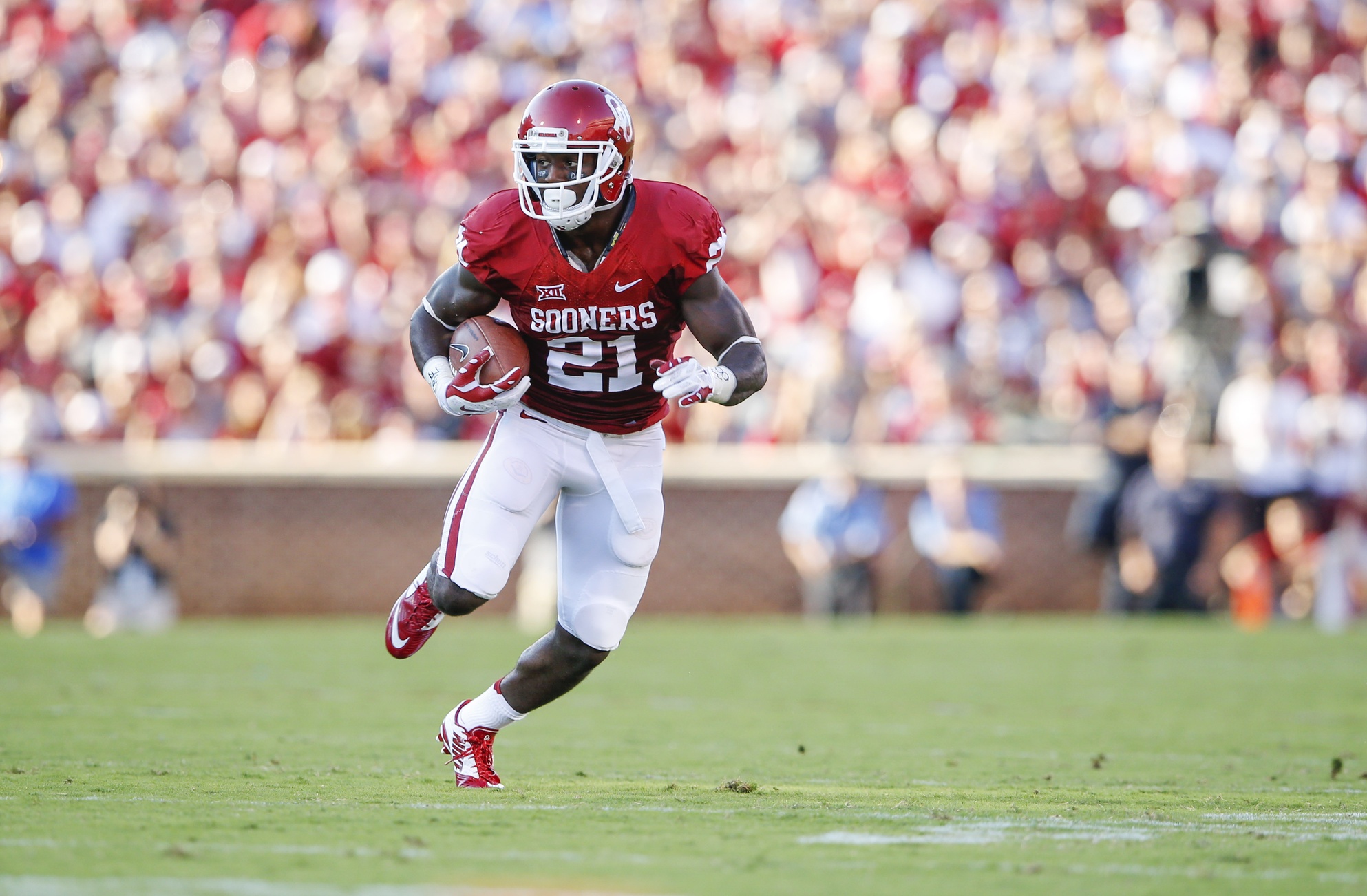In the not too distant past, Tennessee was a power in college football. It was just 1998 when the Volunteers won the national championship. Since 1998, they have had just four double-digit win seasons and they haven’t had a winning season in four years. Tennessee’s cumulative record from 2008 to 2013 was 33-41. Some bad decisions and hires have set them back for quite a while.
Now in year two under Butch Jones, there appears to be a light at the end of the tunnel, but will it be bright enough to upset one of the top ranked teams in the country?
Tennessee came into the season with huge questions marks on both sides of the line of scrimmage.
The offensive line has played well so far, but the Vols continue to shuffle pieces around as they enter the Oklahoma game. The line has allowed four sacks in the first two games, but veteran quarterback Justin Worley has looked comfortable behind his protectors.
In 2013, Worley completed 55.6 percent of his passes with 10 TDs against 8 INTs. So far in 2014, he is completing 64.5 percent of his passes and has 5 TDs versus 1 INT. When Worley won the starting job in fall camp, there wasn’t exactly an outpouring of support based on previous performance, but he has had a positive effect on this very young team (Tennessee played 21 true freshmen against Utah State) through two games.
One area that will be important for the Vols in Saturday’s game is establishing a running attack. Freshman Jalen Hurd is starting to get comfortable (he had 83 yards rushing against Arkansas State in 23 attempts), but the running game has still struggled in its first two games: The Vols average just 3.31 yards per carry. If the Vols want to hang with the Sooners on the road, the offensive line will have to step up and create some holes for Hurd and Marlin Lane Jr.
The area that contains the most talent for the Vols is the wide receiver position, but without a solid running game, it will be tough for Worley and this crew to get off to a quick start. Von Pearson (7 receptions on the season) is out Saturday and tight end Ethan Wolf (8 receptions) is questionable, but the Vols still have a slew of talent in Marquez North, Josh Smith, Pig Howard, Jason Croom, and Josh Malone. The talent on hand can give the Sooners problems, but the UT needs to be balanced on offense to attack.
Oklahoma comes into this game having blown out both Louisiana Tech (which blew out Louisiana-Lafayette in week two) and Tulsa (which edged Tulane in week one). While Tennessee is still forging its identity, Oklahoma knows who and what it is… and wants to become.
Unlike the Vols, the Sooners have a very experienced offensive line (107 starts entering the season), and that has helped break in a trio of running backs (Keith Ford, Alex Ross and Samaje Perine) so far this season. Experience up front has also helped sophomore quarterback Trevor Knight settle in.
The Sooners are averaging 6.25 yards per carry (5.17 if you take out Keith Ford’s big 82-yard run from Saturday against Tulsa), and their offense will present a number of problems for the Vols’ defensive line.
Can the Vols get pressure on Trevor Knight while also containing his ability to run (he has 9 carries for 52 yards)?
Can the Vols keep the Sooners’ running backs from breaking off big chunks of yardage?
Like the offensive line, the Vols’ defensive line is inexperienced, but it is quicker and more athletic than in the past. Over the last two weeks the members of Tennessee’s defensive front have played well, but they will face a completely different animal in Norman than they did the previous two weeks in the friendly confines of Neyland Stadium. The Sooners will throw a bevy of running backs at the Vols and Knight will mix it up on offense a lot more than the Vols’ previous opponents have.
One area of huge improvement for the Vols on defense so far this season has been on third down. Through two games, the Vols are allowing opponents to convert on just 7 of 31 third down attempts (22.58 %). While third down is very important, keep an eye on what happens before third down on Saturday and what situations the Sooners face when they get to third down. Down and distance will be very important in this matchup.
So far this season, Trevor Knight has a 144.76 QB rating on first down. He has completed 66.7 percent of his passes on first down (compared to 58.8 percent overall). His 2014 stats are limited to just two games of data, but when Knight has to pass on third and 4-6 yards he is getting the first down two-thirds of the time. When he’s forced to pass on third and seven or more yards he is getting the first down 36.3 percent of the time.
For the Vols, it’s about setting up third down which is something they’ve done very well this year (so far). Tennessee has received two good tests so far in Arkansas State and Utah State, but they are nothing like the Sooners.
I checked in with TSS contributor Allen Kenney of Blatant Homerism, a great Oklahoma-based site, and he thinks we may see Tennessee’s defensive backs cheat up a bit and force Knight to consistently hit the deep ball. This would be in line with the Vols’ intent to set up third downs. Allen knows a bit about the Vols’ secondary, since their coach, Willie Martinez, was the OU defensive backs coach just a couple of years ago.
This is not the same Tennessee team that went to Eugene in week three of the 2013 college football season and got waxed by 35 points. Butch Jones has Tennessee on the right track and is gaining traction to get the Vols back to their past levels of pronounced success. On Saturday, we will see exactly how far they have come and how far they have left to travel. I don’t expect the Vols to upset the Sooners on Saturday, but I do expect them to give the Sooners a little more than they might be expecting.



